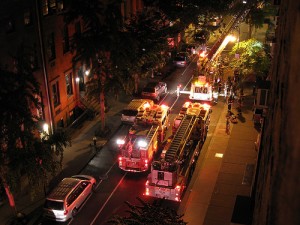 SafeTech Alarm System’s President, Sean O’Leary feels that bylaws that fine Toronto home owners for false fire alarms are excessive and restrictive. In the last six months over 800 Toronto residents have been fined $1050 by the Toronto Fire Department for false alarms caused by their home security system.
SafeTech Alarm System’s President, Sean O’Leary feels that bylaws that fine Toronto home owners for false fire alarms are excessive and restrictive. In the last six months over 800 Toronto residents have been fined $1050 by the Toronto Fire Department for false alarms caused by their home security system.
If a home equip with a monitored security system experiences a fire alarm, the alarm company’s central monitoring station is alerted and will attempt to contact the home to see if there is a fire. If the home owner can not be reached the central monitoring station will dispatch the fire department. In some cases the fire department arrives to find it was an equipment malfunction or a small incident that did not require the dispatch of fire engines. Due to the high cost of dispatching firefighters to a residence earlier this year the Toronto City Council passed a bylaw enforcing a $1050 fine for any resident who cause a false alarm.
False Alarm Report
In an article on November 25th, 2010, the Toronto Star detailed the story of Andrew Cole, a home owner who recently received the hefty fine when his home alarm system malfunctioned and triggered a false alarm. Cole returned home from walking his dog to find three fire engines outside of his house. It was the first false alarm Cole had ever experienced and he was shocked when he received a fine in the mail. Cole explained in the article that he may just let his alarm system contract expire without renewing it because the cost of the false alarm outweighs the benefits he feels he gets from his system. Cole’s reaction is frustrating for Sean O’Leary, President and CEO of SafeTech Alarm Systems, to hear. O’Leary feels that the new bylaws place home security companies between a rock and a hard place. O’Leary explained that he has two choices, the first being dispatching the fire department when SafeTech receives an alarm call that can not be confirmed. This choice could lead to angry clients who receive a hefty fine and then choose to discontinue their service as a result. The second choice is to only dispatch the fire department when a fire can be confirmed. This choice however increases liability because a fire could actually be taking place and waiting longer to contact the fire department reduces the impact of having a security system in the first place.
Cole’s reaction is frustrating for Sean O’Leary, President and CEO of SafeTech Alarm Systems, to hear. O’Leary feels that the new bylaws place home security companies between a rock and a hard place. O’Leary explained that he has two choices, the first being dispatching the fire department when SafeTech receives an alarm call that can not be confirmed. This choice could lead to angry clients who receive a hefty fine and then choose to discontinue their service as a result. The second choice is to only dispatch the fire department when a fire can be confirmed. This choice however increases liability because a fire could actually be taking place and waiting longer to contact the fire department reduces the impact of having a security system in the first place.
O’Leary takes his criticism of the new Toronto Bylaws a step further by arguing that they might not even be constitutional. “Section 2B of The Canadian Charter of Rights and Freedoms, restricts the government from passing laws that are too restrictive or too expressive, justice requires that reasonable middle ground be achieved”, says O’Leary. “Dispatching three fire trucks instead of one to investigate a potential fire may be excessive. Not allowing a dispatch in progress to be cancelled by the home owner or monitoring station if they realize it is a false alarm is too restrictive. Finally maintaining a zero-tolerance policy and not allowing a premise owner at least one warning before assessing a large fine is too excessive”.
Since the new bylaws have been established three of SafeTech’s customers have had the fire department dispatched to their homes for false alarms. To avoid further false alarm fines for his clients O’Leary has implemented a program called “Call Crisis Only”. Under this new initiative a fire engine is not deployed unless a fire is verified. While this program will combat the fines for SafeTech’s customers the main answer lies in a revaluation of the bylaws.
